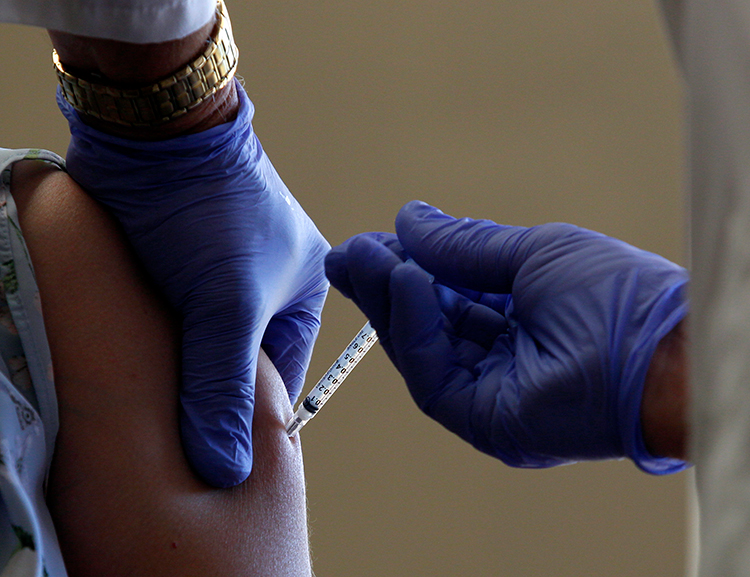
At Consulate Health Care of Vero Beach, a 159-bed skilled nursing facility where the staff intimately cares for the frailest of patients, only one-quarter of the workers are vaccinated against COVID-19.
Sea Breeze’s current staff vaccination rate hasn’t improved at all since emergence of the aggressive Delta variant, and stands only slightly better than Consulate’s, at 28 percent. At Orchid Cove, the nursing home and rehab center that used to be Grace Rehab, the staff vaccination rate of 25.9 percent is even lower than pre-Delta, by 2 percent.
The Delta surge, which has seen COVID-19 kill 27 patients in long-term care facilities located in Indian River County during the six-week period ending Sept. 25, appears to have barely fazed vaccine-hesitant workers at these three of the area’s seven nursing homes.
Now, the federal government – with the full backing of leaders of Florida’s long-term care industry – proposes to make vaccination a condition of employment not just in nursing homes, but in all of health care.
How that mandate will rescue an apparently dead-in-the-water vaccination effort here without prompting mass staff departures in a field already stretched thin is literally a matter of life and death at some facilities.
The trade-off of protection against COVID-19 with the essential care such homes must offer is a challenge administrators fear could lead to nurses leaving their jobs, which in turn could mean reduced admissions, worse staffing ratios and lower ratings. It could also mean higher costs if high-demand positions like nursing aides require pay increases to attract vaccinated workers.
In two states that already have vaccine mandates in place for healthcare workers, the number of staffers leaving over the issue has been negligible, according to reports. But both California and New York had far higher average rates of healthcare worker vaccination prior to the announcement of the mandate. Florida, with a rate of just over 52 percent, will face a much bigger hurdle when the national mandate goes into effect.
As the industry awaits specifics of the federal mandate expected this month, the Centers for Medicare and Medicaid Services (CMS) two weeks ago launched an easier way to check on a nursing home’s vaccination rates, with biweekly updates to its Nursing Home Compare.
The site does not show cases or deaths by facility, though, and neither do state health department COVID reports, though they did through last May. The site also doesn’t show hospital vaccination rates, nor does it include rates at assisted living facilities.
In Indian River County, only three of the seven nursing homes have staff vaccination rates above the state nursing home staff average of 52.4 percent.
Florida Baptist bested the average with a 72 percent staff vaccination rate. Willowbrooke Court, the skilled nursing component at Indian River Estates, showed a rate of 65 percent of staff vaccinated against COVID-19.
Palm Garden, a 153-bed nursing home consistently among the worst-rated local facilities on regulatory websites, has succeeded in vaccinating 60 percent of its staff. But that figure has remained unchanged since the end of July.
Even the county’s only hospital-based rehab center has a rate well below the population at large, and barely improved since Delta. The transitional care unit within Steward Sebastian River Medical Center shows a staff vaccination rate of only 47 percent, a rise of only 3 percent in the past two months.
Both Florida Baptist and Willowbrooke showed 100 percent of their residents vaccinated, far higher than Sea Breeze and Consulate, that each reported just over half their residents vaccinated.
The low rates of staff vaccination here are a major disappointment to vaccine strategists.
When the COVID-19 vaccine became available in December 2020, among the first to be offered the shot were healthcare workers, the hope being to inoculate frontline workers in the pandemic, thereby ensuring staff would be able to care for patients without themselves or their families getting infected, and that they would avoid catching the coronavirus in their private lives and bringing it into the facility.
Medical workers were also seen as ambassadors of vaccination, science-aware citizens who would spread the good word to their patients. While that may be the case for many, a significant contingent has resisted vaccination and now may be influencing people with their anti-vaccine stance.
The Florida Health Care Association, a trade group representing Florida’s long-term care facilities, praised the proposed federal mandate for nursing home staff – and particularly once the Biden administration had expanded it to all healthcare workers, a move it considered more “fair,” the group said.
Meanwhile, the ranks of the vaccinated don’t seem to be increasing by much here in the population at large.
Last week, as the county’s COVID-19 cases dipped to 237, a drop of 74 percent compared to the previous week, hospitalizations and deaths fell by around a third. But the percentage of fully vaccinated people here remained the same as the prior week: 59 percent.



